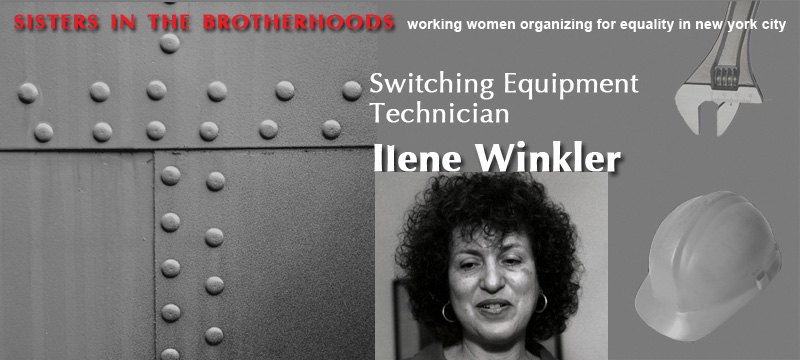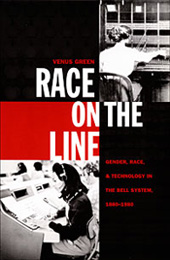 |
|||||||
|
|||||||
|
In 1973 the federal government and American Telephone and Telegraph (AT&T)—the largest single employer of women—signed a landmark consent decree. The agreement was intended to eliminate the company's discriminatory recruiting, hiring and promotion practices against women and minorities.
Ilene Winkler, a college graduate, had been working in a low-paying job in publishing when she heard that AT&T was hiring. She applied for a job and was hired as a "switchman" in 1974.These technicians worked on the equipment that processed phone calls. (A few years later the job title was changed to "switching equipment technician.") She attended a rigorous training school, which had a high dropout rate for both genders. Women faced enormous obstacles once they were on the job, working in the "switch room" or on "the frame." White men who held these skilled positions understandably felt threatened by the newcomers. Winkler joined Local 1101, Communications Workers of America (CWA), which represented New York Telephone workers and some AT&T workers in Manhattan and the Bronx. CWA declined to participate in discussions with the EEOC and AT&T on issues covered by the terms of the collective bargaining agreement. Instead, it entered into litigation in an unsuccessful attempt to head off the agreement. Local 1101 continued to play a negative role by pitting worker against worker. It filed reverse discrimination suits, and together with management played up the fear factor that divided workers. Women generally were not trained in the higher skills of the job, and consequently the craft's division of labor usually funneled women into lower-craft duties. Winkler found people who were willing to teach her, and she enjoyed the work. Electronic systems were new to workers and management, and consequently workers had considerable responsibility and autonomy. Within a few years the introduction of modern supercomputers radically altered the switching technician's duties. Winkler was a union activist. She served as a steward but also took on the more difficult outsider role of reformer within her union. Women's issues were getting "swallowed up" within the local's agenda, and she believed that agitation was necessary to gain the attention of both the membership and the union leadership. She was a member of a caucus that produced The Bell Wringer, a newspaper whose goal was to build awareness and a sense of involvement. For decades the publication consistently promoted women's issues alongside many other concerns shared by the entire membership. Some of these items eventually made their way into CWA's bargaining demands. Nevertheless, Winkler and other activists believed CWA's unionism was not up to the challenges facing the workers. Eleven years after producing the first issue of The Bell Wringer, the caucus assembled a slate of electoral candidates to oppose the union leadership. Effective union representation on a whole host of critical issues was on caucus agenda. Winkler ran for treasurer on the The Bell Wringer slate. Winkler retired after 28 years with the phone company. In 2005 she completed a master's degree in public history at New York University. She had breast cancer in 2000 and now is on the staff of SHARE, a peer-support organization for women with breast and ovarian cancer. In her interview Winkler discusses her activism, the influence of changing technology on her job, and the disparate circumstances of blue-collar and white-collar feminists within AT&T. |
||||||
| |||||||
Copyright 2012 Jane LaTour/Talking History |
|||||||
